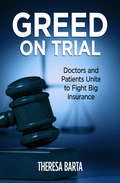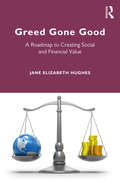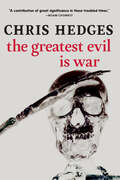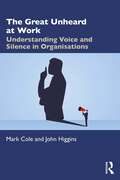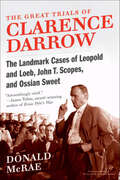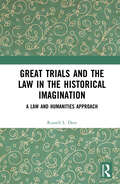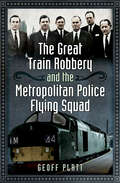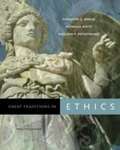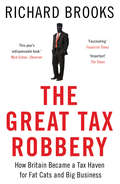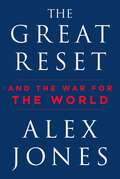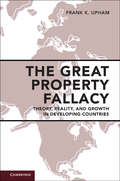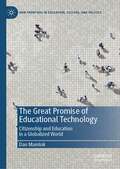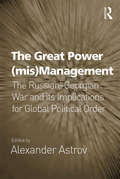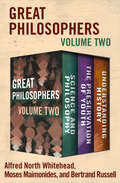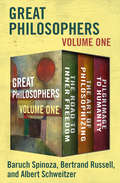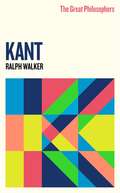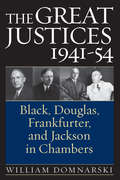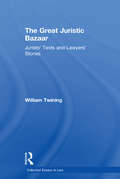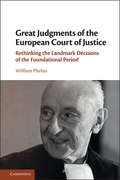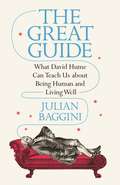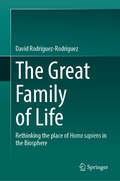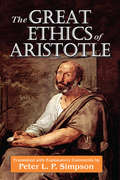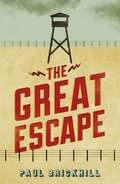- Table View
- List View
Greed on Trial: Doctors and Patients Unite to Fight Big Insurance
by Theresa BartaA trial attorney recounts her fight against insurance companies who put profit before patients—and wrongfully terminate doctors who don&’t comply.In the modern world of American medicine, insurance companies call the shots. Their policies often require cutting corners on patient care in pursuit of profit. These policies often reduce the amount of time doctors spend with patients, push older and cheaper medications, and limit the number of tests and referrals doctors can order. And if doctors don&’t comply, they could lose their insurance affiliations.Despite the risks, some brave doctors choose to resist these policies—only to find themselves out of a job. That&’s where attorney Theresa Barta steps in. Barta specializes in suing insurers and health-care companies who wrongfully terminate doctors. In Greed on Trial, Barta&’s takes readers inside three dramatic and important cases from her files. In each story, we watch Theresa assemble her evidence and fight the scourge of insurance company abuse in the court of law.
Greed Gone Good: A Roadmap to Creating Social and Financial Value
by Jane Elizabeth HughesGreed Gone Good: A Roadmap to Creating Social and Financial Value brings the how-tos of impact finance to a broad- based audience of investors, from the individual to the institutional. Written in an engaging, jargon-free style and loaded with practical advice, it explores the pitfalls and potential of the burgeoning impact revolution—the increasingly widespread belief that business and financial leaders should weigh social value as well as financial value in all of their decisions, to create both a better business model and a better world. Cheerleaders have written a number of books advocating the magic of impact finance. Greed Gone Good hopes for the magic too, but also believes that an uncritical eye does not effectively advance the cause. We now have 10 years of impact investing history to examine, and not all of it is laudable. We could hold hands and sing Kumbaya in praise of impact finance; or we could employ constructive criticism to figure out what’s gone well and what hasn’t, and how we should move forward more productively. Greed Gone Good focuses on the roadmap—how to reorient and repackage finance and investing in order to deliver on this promise. In particular, it focuses on how to realize the potential of the impact revolution to become a silver bullet against future failures. Green Gone Good will have widespread appeal to investors ranging from individuals and family offices to the world’s largest asset managers and investors.
The Greatest Evil is War
by Chris HedgesAn unflinching indictment of the horror and obscenity of war by one of our finest war correspondents.Drawn from experience and interviews by Pulitzer-prize-winner Chris Hedges, this book looks at the hidden costs of war, what it does to individuals, families, communities and nations.In fifteen short chapters, Chris Hedges astonishes us with his clear and cogent argument against war, not on philosophical grounds or through moral arguments, but in an irrefutable stream of personal encounters with the victims of war, from veterans and parents to gravely wounded American serviceman who served in the Iraq War, to survivors of the Holocaust, to soldiers in the Falklands War, among others. Hedges reported from Sarajevo, and was in the Balkans to witness the collapse of the Soviet Union. In 2002 he published War Is a Force that Gives Us Meaning, which the Los Angeles Times described as &“the best kind of war journalism… bitterly poetic and ruthlessly philosophical&” and the New York Times called &“a brilliant, thoughtful, timely, and unsettling book.&” In the twenty years since, Hedges has not wanted to write another book on the subject of war—until now, with the outbreak of war in Ukraine. It is important again to be reminded who are the victors of the spoils of war and of other unerring truths, not only in this war but in all modern wars, where civilians are always the main victims, and the tools and methods of war are capable of so much destruction it boggles the mind. This book is an unflinching indictment of the horror and obscenity of war by one of our finest war correspondents.
The Great Unheard at Work: Understanding Voice and Silence in Organisations
by Mark Cole John HigginsSilence always has something to say – it’s never neutral and speaks volumes if people are willing to hear. Our response to silence is often to dismiss or end it, to block it out with noise. Instead, silence needs to be taken seriously. This book explores the importance of understanding silence and shows how we can move from merely listening to truly hearing those around us. The interplay of voice and silence in organisational life is not straightforward. We can feel pressured to speak and compelled to keep our silence. Knowing how to read silence, to make sense of its generative and degenerative capacity, is a rarely developed skill among managers and leaders at all levels – who have been brought up to see silence as evidence of compliance or a weakness to be addressed. But it is a critical skill for managers and employees alike. Written by two experts in organisational development, this book explores different types of silence and their implications for organisational practice, digging into the theoretical roots and engaging with real stories and voices. It provides everyone at work with an understanding of the different meanings of silence and how to engage well with it. When to stay with it, when to join in with it, and when to be struck by what’s not being said and do something about it. The Great Unheard at Work is essential reading for corporate leaders, HR professionals in all sectors, business students, professionals, and anyone interested in leadership development.
The Great Trials of Clarence Darrow: The Landmark Cases of Leopold and Loeb, John T. Scopes, and Ossian Sweet
by Donald McRae“Wonderfully evocative… Donald McRae captures the Great Defender in all his complexity.... A joy to read.” — Kevin Boyle, National Book Award-winning author of Arc of Justice"Astonishingly vivid." —James Tobin, Award-winning author of Ernie Pyle’s WarThe story of the three dramatic trials that resurrected the life and career of America’s most colorful—and controversial—defense attorney: Clarence Darrow. Many books, plays, and movies have covered Darrow and the trials of Leopold and Loeb, John T. Scopes, and Ossian Sweet before: Geoffrey Cowan’s The People v. Clarence Darrow; Simon Baatz’s For the Thrill of It; Kevin Boyle’s Arc of Justice; Meyer Levin’s Compulsion and the film adaptation of the same name; Inherit the Wind; but few, if any, have achieved the intimacy and immediacy of Donald McRae’s The Great Trials of Clarence Darrow.
Great Trials and the Law in the Historical Imagination: A Law and Humanities Approach
by Russell L. DeesGreat Trials and the Law in the Historical Imagination: A Law and Humanities Approach introduces readers to the history of law and issues in historical, legal, and artistic interpretation by examining six well-known historical trials through works of art that portray them. Great Trials provides readers with an accessible, non-dogmatic introduction to the interdisciplinary ‘law and humanities’ approach to law, legal history, and legal interpretation. By examining how six famous/notorious trials in Western history have been portrayed in six major works of art, the book shows how issues of legal, historical, and artistic interpretation can become intertwined: the different ways we embed law in narrative, how we bring conscious and subconscious conceptions of history to our interpretation of law, and how aesthetic predilections and moral commitments to the law may influence our views of history. The book studies well-known depictions of the trials of Socrates, Cicero, Jesus, Thomas More, the Salem ‘witches’, and John Scopes and provides innovative analyses of those works. The epilogue examines how historical methodology and historical imagination are crucial to both our understanding of the law and our aesthetic choices through various readings of Harper Lee’s beloved character, Atticus Finch. The first book to employ a ‘law and humanities’ approach to delve into the institution of the trial, and what it means in different legal systems at different historical times, this book will appeal to academics, students and others with interests in legal history, law and popular culture and law and the humanities.
The Great Train Robbery and the Metropolitan Police Flying Squad
by Geoff PlattThe Squad that investigated The Great Train Robbery. "The Old Grey Fox" or "One Day Tommy" (Detective Chief Superintendent Tommy Butler) selected six of the best officers on the elite Metropolitan Police Flying Squad to investigate the Crime of the Century, but whilst many books have been written by and about every criminal arrested for this crime, NONE have been written about the detectives who traced and tracked them. Tommy Butler delayed his retirement to complete the job, but died a few months after he retired at 57 years of age, the only detective of his rank in the late 1950s and 1960s not to publish an autobiography.This book provides a detailed account of the men tasked with tracking down the most notorious thieves in British history. It examines the investigation in detail and asks how it would contrast with the methods used today should a similar incident take place.Geoff Platt examines what happened to these men after the investigation was closed and the effect it had on both their personal and professional lives.
Great Traditions in Ethics (12th edition)
by Sheldon P. Peterfreund Nicholas P. White Theodore DeniseThis anthology contains readings in Western ethical theory by 27 philosophers from Plato to Bernard Williams. The late Denise (Syracuse U.) et al. begin with a section on classic ethical traditions and topics such as knowledge, virtue, and morality, and conclude with modern continuations and critiques of ideas such as social justice and religion. The introductions to philosophers have been revised, and the appendix on applied ethics (using the preceding readings) has been expanded. There is no index. Annotation ©2007 Book News, Inc., Portland, OR (booknews.com)
The Great Tax Robbery
by Richard BrooksInvestigative journalist and former tax-inspector Richard Brooks makes a mockery of government promises to "crack" the problem of tax avoidance. Discover why thousands of British state schools and NHS hospitals are owned by shell companies based in offshore tax havens; how "British" companies like Vodafone are designing their own tax laws; and how the taxman turns a blind eye to billions in illegally evaded tax in secret Swiss bank accounts. This ground-breaking exposé charts how the UK has become a global tax haven that serves the super wealthy, while everyone else picks up the bill. From offshore City bonus schemes to the exploitation of developing countries, Brooks unpicks the tangled mess of loopholes that well known multinationals, bankers, and celebrities use to legally circumvent British tax. Shocking and riveting, this is a bold manifesto for a tax system where we all contribute our fair share.
The Great Reset: And the War for the World
by Alex JonesIn The Great Reset: And the War for the World, the most controversial man on earth Alex Jones gives you a full analysis of The Great Reset, the global elite's international conspiracy to enslave humanity and all life on the planet. If you really want to know what&’s happening in the world, this is the one book you must read now. Alex Jones is the most censored man on the planet and you should ask yourself why that is. There is a powerful authoritarian takeover in process that is seeking to capture the entire human system and turn it into an artificial factory farm controlled system. We are in a war for the future of the world. In this book, you will hear from the world&’s elites, from their own mouths, what they are planning for you and your families and you will learn what you can do to fight it.From central bankers, corporate billionaires, and corrupted government officials, global elites have been organizing a historic war on humanity under a trans-humanist, scientific dictatorship. Alex Jones was the first major figure to expose the World Economic Forum&’s agenda. He has dedicated the last 30 years of his life to studying The Great Reset, conducting tens of thousands of interviews with top-level scientists, politicians, and military officials in order to reverse engineer their secrets and help awaken humanity. The Great Reset: And the War for the World chronicles the history of the global elites' rise to power and reveals how they&’ve captured the governments of the world and financed The Great Reset to pave the way for The New World Order. Once dubbed a conspiracy theory, but now openly promoted by the most powerful corporations and governments, The Great Reset is a planned attempt to redistribute all the world&’s wealth and power into the hands of banks, corporations, billionaires, and The World Economic Forum. If you read one book in a lifetime, this is it. In The Great Reset: And the War for the World, you will discover from the self-appointed controllers of the planet in their own words, their plan for what they call the final revolution, or The Great Reset. The only way this corporate fascist conspiracy can succeed is if the people of the world are not aware of it. And this book lays out their sinister blueprint and how to stop it. While many great books have been written to help awaken people to this sinister agenda, no author has ever spent as much time and research on The Great Reset as Alex Jones. The Great Reset: And the War for the World is the undisputed trailblazer for understanding what&’s happening and how to stop it.
The Great Property Fallacy: Theory, Reality, and Growth in Developing Countries
by Frank K. UphamIn this groundbreaking book, Frank K . Upham uses empirical analysis and economic theory to demonstrate how myths surrounding property law have blinded us to our own past and led us to demand that developing countries implement policies that are mistaken and impossible. Starting in the 16th century with the English enclosures and ending with the World Bank's recent attempt to reform Cambodian land law - while moving through 19th century America, postwar Japan, and contemporary China - Upham dismantles the virtually unchallenged assertion that growth cannot occur without stable legal property rights, and shows how rapid growth can come only through the destruction of pre-existing property structures and their replacement by more productive ones. He argues persuasively for the replacement of Western myths and theoretical simplifications with nuanced approaches to growth and development that are sensitive to complexity and difference and responsive to the political and social factors essential to successful broad-based development.
The Great Promise of Educational Technology: Citizenship and Education in a Globalized World (New Frontiers in Education, Culture, and Politics)
by Dan MamlokThis book critically looks at the tensions between the promise to transform education through the use of digital technology and the tendency to utilize digital technology in instrumental and technical ways. The widespread use of digital technology has had a remarkable effect on almost every domain of human life. This technological change has caused governments, educational departments, and non-governmental organizations (NGOs) to recognize the need to develop educational plans that would support the social and the cultural changes that have occurred with the ubiquitous permeation of digital technology into our everyday lives. This book challenges common assumptions regarding digital technology and education, through critical exploration of educational policies, interviews, and class observations in the US and Israel. In doing so, the author sheds light on the possibilities of advancing digital citizenship under current educational policies.
The Great Power (mis)Management: The Russian–Georgian War and its Implications for Global Political Order
by Alexander AstrovDrawing on the empirical case of the Russian-Georgian war of 2008, the book explores the theoretical underpinnings of the idea of 'great power management' first articulated within the English School of International Relations. The contributors to the volume approach this idea from a variety of theoretical perspectives, ranging from policy-analysis to critical theory, but all of them are addressing the same question: What does the Russian-Georgian war of 2008 tell us about great power management as an institution of international society?
Great Philosophers Volume Two: Science and Philosophy, The Preservation of Youth, and Understanding History
by Alfred North Whitehead Moses Maimonides Bertrand RussellThree essential philosophers on the nature of reality, the health of the human body, and the meaning of history.Science and Philosophy: An essential introduction to Alfred North Whitehead&’s life and philosophy. From personal reflections to his groundbreaking essay &“Process and Reality&” to an enlightening discussion of Einstein&’s theories, Science and Philosophy is a must-read for anyone seeking to understand one of the modern world&’s greatest thinkers. The Preservation of Youth: Capitalizing on his experience as a physician as well as his knowledge of classical and medieval principles of healing, Moses Maimonides provides a comprehensive theory of wellbeing. In this work he addresses common medical conditions including asthma, diabetes, hepatitis, and pneumonia, and makes recommendations on diet and exercise, sex life, and the underlying psychological causes of illness. Understanding History: Written during the height of World War II, these vigorous essays by Bertrand Russell present his influential theories on the nature of history. The title piece exposes the deadliness of the academic approach to the past, and shows how the reading of history can be a vivid intellectual pleasure.
Great Philosophers Volume One: The Road to Inner Freedom, The Art of Philosophizing, and Pilgrimage to Humanity
by Baruch Spinoza Bertrand Russell Albert SchweitzerEssential teachings, brilliant musings, and provocative theories from three of history&’s greatest thinkers.The Road to Inner Freedom: The seventeenth-century Dutch philosopher Baruch Spinoza views the ability to experience rational love of God as the key to mastering the contradictory and violent human emotions. The Art of Philosophizing: These groundbreaking essays by Bertrand Russell deal with &“the art of reckoning&” in the fields of mathematics, logic, and philosophy. With great clarity and simple exposition, Russell gets to the core of philosophical inquiry and analysis. Pilgrimage to Humanity: Albert Schweitzer discusses his philosophy of culture, the course of his life, his ministry to human needs in Africa, the idea of reverence for life, the ideal of world peace, the significance of liberal Christianity, and the lives, world-views, and contributions of Johann Goethe, Johann Sebastian Bach, and Jesus of Nazareth.
The Great Philosophers:Kant (GREAT PHILOSOPHERS)
by Ralph Walker'Happiness is not an ideal of reason, but of imagination.' KantIn today's increasingly fractured world of oppression and uncertainty, Kant's moral philosophy is more important than ever before. And never has the need for moral absolutes been more pressing than in this age of doubt, disillusion and cynicism. This is where Kant comes in, as his moral philosophy continues to compel the attention of every serious thinker in the field. Clear, concise - and overwhelmingly convincing - Ralph Walker's stimulating, highly accessible guide spells out the power and renewed relevance of his thinking: a genuinely objective, absolute basis for a modern moral law.
The Great Leveler: Capitalism and Competition in the Court of Law
by Brett ChristophersBrett Christophers shows how laws help capitalism maintain a crucial balance between competition and monopoly. When monopolistic forces dominate, antitrust law discourages the growth of corporations and restores competitiveness. When competition becomes dominant, intellectual property law protects corporate assets and encourages investment.
The Great Justices 1941-54
by William DomnarskiDomnarski is a practicing intellectual property attorney in California and the author of a previous book on the history and nature of federal court judicial opinions. In this text, the author compares four brilliant and diverse jurists of the Roosevelt-era Court--Hugo Black, William O. Douglas, Felix Frankfurter, and Robert Jackson--during the period from 1941 to 1954. The study explores the Court's evolving civil rights jurisprudence that was born in the period during which the four justices served together, considers the Court as an institution and its relation to the American public, and analyzes how four individual justices sharing core jurisprudential beliefs and ambitions before appointment would later divide into competing liberal and conservative factions. Annotation ©2006 Book News, Inc. , Portland, OR (booknews. com)
The Great Juristic Bazaar: Jurists' Texts and Lawyers' Stories (Collected Essays In Law Ser.)
by William TwiningSome law students find jurisprudence daunting, impersonal, dry and seemingly detached from practical affairs. William Twining believes that many jurists have been fascinating people struggling with questions that are both historically significant and relevant to contemporary issues. This book brings together previously published essays that centre on three related themes: reading Juristic texts, the role of narrative in law, and relations between theory and practice. Building on a pragmatic view of jurisprudence, the author explores different ways of reading and using Juristic texts, to set them in context, to bring them to life and to engage with the reader's own concerns. He applies this approach to throw fresh light on four familiar figures - Holmes, Bentham, Hart and Llewellyn. Challenging limited agendas and parochial points of view, Twining outlines a programme for a broad approach to legal theory in the context of globalization. He satirizes some bad habits in jurisprudence and explores in depth how stories can be seductive vehicles for cheating in legal contexts, yet are essential for making sense of disputes about fact or law.
Great Judgments of the European Court of Justice: Rethinking the Landmark Decisions of the Foundational Period
by William PhelanGreat Judgments of the European Court of Justice presents a new approach to understanding the landmark decisions of the European Court of Justice in the 1960s and 1970s. By comparing the Court's doctrines to the enforcement and escape mechanisms employed by more common forms of trade treaty, it demonstrates how the individual rights created by the doctrine of direct effect were connected to the practical challenges of trade politics among the European states and, in particular, to the suppression of unilateral safeguard mechanisms and inter-state retaliation. Drawing on the writings and speeches of French Judge and President of the Court, Robert Lecourt, it demonstrates that one of the Court's most influential judges shared this understanding of the logic of direct effect. This book offers a distinctive interpretation of the Court of Justice's early years, as well as of the purpose of the fundamental principles of European law.
The Great Guide: What David Hume Can Teach Us about Being Human and Living Well
by Julian BagginiInvaluable wisdom on living a good life from one of the Enlightenment's greatest philosophersDavid Hume (1711–1776) is perhaps best known for his ideas about cause and effect and his criticisms of religion, but he is rarely thought of as a philosopher with practical wisdom to offer. Yet Hume's philosophy is grounded in an honest assessment of nature—human nature in particular. The Great Guide is an engaging and eye-opening account of how Hume's thought should serve as the basis for a complete approach to life.In this enthralling book, Julian Baggini masterfully interweaves biography with intellectual history and philosophy to give us a complete vision of Hume's guide to life. He follows Hume on his life's journey, literally walking in the great philosopher's footsteps as Baggini takes readers to the places that inspired Hume the most, from his family estate near the Scottish border to Paris, where, as an older man, he was warmly embraced by French society. Baggini shows how Hume put his philosophy into practice in a life that blended reason and passion, study and leisure, and relaxation and enjoyment.The Great Guide includes 145 Humean maxims for living well, on topics ranging from the meaning of success and the value of travel to friendship, facing death, identity, and the importance of leisure. This book shows how life is far richer with Hume as your guide.
The Great Family of Life: Rethinking the place of Homo sapiens in the Biosphere
by David Rodríguez-RodríguezThis book explains the causes, consequences and desirable solutions to the unbalanced and unfair relationship between Homo sapiens and the other species that inhabit Planet Earth in a succinct, enjoyable and thought-provoking way. Major sociological, economic, political, educational, religious and phylosophical perspectives are reviewed in order to understand why we have reached the current alarming status of global biodiversity during the Anthropocene, and how we can react to it to attain not just human welfare, but global happiness. The target audience is wide, from the general public interested in the deep inner causes of environmental degradation, to college and university students and lecturers, notably in the fields of environmental ethics, environmental philosophy, environmental law and environmental politics.
The Great Ethics of Aristotle
by Peter L. SimpsonIn this follow up to The Eudemian Ethics of Aristotle, Peter L. P. Simpson centres his attention on the basics of Aristotelian moral doctrine as found in the Great Ethics: the definition of happiness, the nature and kind of the virtues, pleasure, and friendship. This work's authenticity is disputed, but Simpson argues that all the evidence favours it. Unlike the Nicomachean and Eudemian Ethics, Aristotle wrote the Great Ethics for a popular audience. It gives us insight less into Aristotle the theoretician than into Aristotle the pedagogue. For this reason, the Great Ethics has distinct advantages as an introduction to Aristotelian ethical thinking: it is simpler and clearer in its argumentation, matters such as the intellectual virtues are made suitably secondary to the practical focus, the moral virtues come through with a pleasing directness, and the work's syllogistic formalism gives it a transparency and accessibility that the other Ethics typically lack. Arius' Epitome, which relies heavily on this work, helps confirm its value and authenticity. Because the Great Ethics is generally neglected by scholars, less has been done to clear up its obscurities or to expose its structure. But to ignore it is to lose another and more instructive way of approaching and appreciating Aristotle's teaching. The translation is prefaced by an analytic outline of the whole, and the several sections of it are prefaced by brief summaries. The commentary supplies fuller descriptions and analyses, sorting out puzzles, removing misunderstandings, and resolving doubts of meaning and intention. This book is a fresh rendition of the work of the preeminent philosopher of all time.
The Great Escape (W&N Military)
by Paul BrickhillThe famous story of mass escape from a WWII German PoW camp that inspired the classic film.One of the most famous true stories from the last war, The GREAT ESCAPE tells how more than six hundred men in a German prisoner-of-war camp worked together to achieve an extraordinary break-out. Every night for a year they dug tunnels, and those who weren't digging forged passports, drew maps, faked weapons and tailored German uniforms and civilian clothes to wear once they had escaped. All of this was conducted under the very noses of their prison guards. When the right night came, the actual escape itself was timed to the split second - but of course, not everything went according to plan...
The Great Escape (CASSELL MILITARY PAPERBACKS)
by Paul BrickhillThe famous story of mass escape from a WWII German PoW camp that inspired the classic film.One of the most famous true stories from the last war, The GREAT ESCAPE tells how more than six hundred men in a German prisoner-of-war camp worked together to achieve an extraordinary break-out. Every night for a year they dug tunnels, and those who weren't digging forged passports, drew maps, faked weapons and tailored German uniforms and civilian clothes to wear once they had escaped. All of this was conducted under the very noses of their prison guards. When the right night came, the actual escape itself was timed to the split second - but of course, not everything went according to plan...
